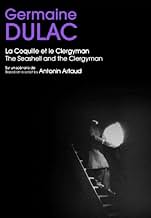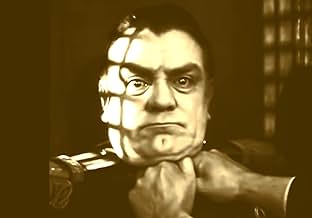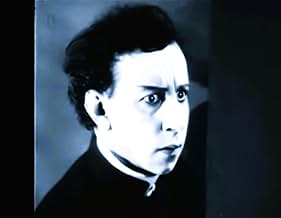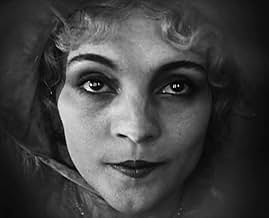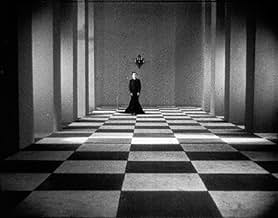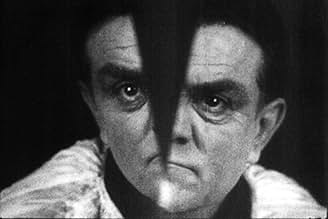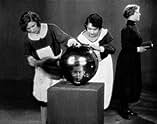La coquille et le clergyman
- 1928
- 40 Min.
IMDb-BEWERTUNG
7,0/10
2404
IHRE BEWERTUNG
Füge eine Handlung in deiner Sprache hinzuObsessed with a general's woman, a clergyman has strange visions of death and lust, struggling against his own eroticism.Obsessed with a general's woman, a clergyman has strange visions of death and lust, struggling against his own eroticism.Obsessed with a general's woman, a clergyman has strange visions of death and lust, struggling against his own eroticism.
- Regie
- Drehbuch
- Hauptbesetzung
Empfohlene Bewertungen
Stumbled upon this on Wikipedia:
quote: The British Board of Film Censors famously reported that the film was "so cryptic as to be almost meaningless. If there is a meaning, it is doubtless objectionable"
I wonder if the fact that this was the work of a female director influenced people of that time to dismiss the importance of this particular piece.
Just with a little research we can find Dulac's political views about gender, thus for me is quite clear the intention behind this film, and perhaps we can have second guesses about the symbols used in it, but her questioning the church, the state and male sexuality and the positioning of women at that time was groundbreaking. Which is sad, because if not but that huge dismissal, this could be catalogued easily as the very first surrealist film of all times, BEFORE Buñuel-Dalí's 'A Chien Andalou' and don't get me wrong I enjoyed it, but even Buñuel stated that he didn't put any meaning behind it, it was just a dream put into film so why the double standard?
Loved the ideas behind The Seashell and the Clergyman, it was great to bump into this film, for it was an amusing discovery!
quote: The British Board of Film Censors famously reported that the film was "so cryptic as to be almost meaningless. If there is a meaning, it is doubtless objectionable"
I wonder if the fact that this was the work of a female director influenced people of that time to dismiss the importance of this particular piece.
Just with a little research we can find Dulac's political views about gender, thus for me is quite clear the intention behind this film, and perhaps we can have second guesses about the symbols used in it, but her questioning the church, the state and male sexuality and the positioning of women at that time was groundbreaking. Which is sad, because if not but that huge dismissal, this could be catalogued easily as the very first surrealist film of all times, BEFORE Buñuel-Dalí's 'A Chien Andalou' and don't get me wrong I enjoyed it, but even Buñuel stated that he didn't put any meaning behind it, it was just a dream put into film so why the double standard?
Loved the ideas behind The Seashell and the Clergyman, it was great to bump into this film, for it was an amusing discovery!
Obsessed with a general's woman (Genica Athanasiou), a clergyman (Alex Allin) has strange visions of death and lust, struggling against his own eroticism.
"Un chien andalou" is considered the first surrealist film, but its foundations in "The Seashell and the Clergyman" have been all but overlooked. However, the iconic techniques associated with surrealist cinema are all borrowed from this early film. Conversely, Alan Williams has suggested the film is better thought of as a work of or influenced by German expressionism.
I think this is why I absolutely adore this film. I'm enamored with German expressionism, and I love surreal film. This is the two combined, and the acting is superb. Anyone who loves "Un chien" really needs to check this one out.
"Un chien andalou" is considered the first surrealist film, but its foundations in "The Seashell and the Clergyman" have been all but overlooked. However, the iconic techniques associated with surrealist cinema are all borrowed from this early film. Conversely, Alan Williams has suggested the film is better thought of as a work of or influenced by German expressionism.
I think this is why I absolutely adore this film. I'm enamored with German expressionism, and I love surreal film. This is the two combined, and the acting is superb. Anyone who loves "Un chien" really needs to check this one out.
If you are looking for a twin movie to go alongside Luis Buñuel's surrealist head-scratcher Un Chien Andalou, then look no further than this film. The Seashell and the Clergyman shares that famous movie's bizarre, often indecipherable, imagery as well as anti-clerical subversion and frank sexuality. I can't say I understood what was going on. I'm not sure if I was even supposed to. But like Buñuel's film this movie is all about surrealism, it doesn't always have logical meaning. An image such as the clergyman crawling through the streets of Paris is something that is not easily forgotten and the film in general operates in the same way as a dream. The best way to appreciate a film such as this is to sit back and take in the imaginative visuals and dream-like ambiance that is specific to these ancient silent movies. If you are at all interested in 20's surrealist cinema then this is a film I would definitely recommend. Also, the fact that a woman made such a provocative film all those years ago is especially surprising seeing as female artists have always struggled with having their voice heard.
At first there seems to be some kind of science experiment. A potion is put from a vial into a pan by what looks to be a clergyman (?) and then a man in a General's uniform uses a sword to chop it down. The camera makes things look woozy, the frame and composition becoming warped and undone, like the feeling of going under or being drunk. We follow the Clergyman as he runs down a street (on his knees?) and then walks down a hall. There's also a woman, and the General is still there, but then... there's visions. He goes to another place mentally, perhaps, seeing a ship, water, waves, all sort of images that seem connected but disconnected at the same time. There's a room full of maids sweeping, then lined in formation. And then that 'Seashell' of the title - revealing (what else) boobs.
So much went into this film, the Seashell and the Clergyman, directed by Germain Dulac and written by one of the real-deal surrealists (and actor) Antonin Artuad, that I'm sure I could watch this five more times - and would want to - and get a different take on it each time. This preceded Un chien Andalou by a year, and yet I feel like these filmmakers and Bunuel/Dali were part of the same movement; whether Bunuel and Dali saw this film before they made their excursion is arguable, and I'd be curious to find out for sure (certainly the one moment where I went "Oh!" was when the clergyman reveals the seashell for the breasts - a similar shot happens in Andalou).
Yet it's impossible to make too many comparisons, because each surrealist goes about in their own way. This one has impressive, uncanny visual effects work for the time, mostly in ways of warping the frame - possibly by stretching the frame in post, or slow-motion in-camera. Then there's the simple act of one person being in a shot, and then the next someone popping up next to the actor through the jump-cut. Smoke is used to great effect at times, especially when violence occurs. Cinema tricks are plenty here, but what I took from the film is how it looks at the inner dream/mind-scape of such a person as the Clergyman. And perhaps this was Artaud's intention, maybe not (the British censors weren't sure what this was, but banned it anyway, possibly a gut reaction).
Why I read into it this way I'm not sure... actually, that's not totally true. It must be noted that this was directed not by a man (as Andalou) but a woman, and I think there's a different take on this because of that - a shot like the one with all the maids bustling about the room, doing their work almost like automatons, that has a woman's touch in a kind of satirical/absurd way. When I watch this film, I see a lot of sexualized imagery, a lot of repression, and it boiling over the surface. The version I watched on YouTube - with a great musical accompaniment that made it feel like a horror film in moments - had the air of an eerie land of nightmare and terror. The best surrealistic shorts has the stream-of-consciousness feel (think Deren or Bunuel or Man Ray), but this one especially has images that perhaps to make sense, in a Dream Logic sort of way, and if one were to follow the images as descriptions on paper, I'm sure it would read more like a poem.
It's a massively successful, deranged effort that can mean many things, but I have a feeling there's something strange about that Man of the Cloth...
So much went into this film, the Seashell and the Clergyman, directed by Germain Dulac and written by one of the real-deal surrealists (and actor) Antonin Artuad, that I'm sure I could watch this five more times - and would want to - and get a different take on it each time. This preceded Un chien Andalou by a year, and yet I feel like these filmmakers and Bunuel/Dali were part of the same movement; whether Bunuel and Dali saw this film before they made their excursion is arguable, and I'd be curious to find out for sure (certainly the one moment where I went "Oh!" was when the clergyman reveals the seashell for the breasts - a similar shot happens in Andalou).
Yet it's impossible to make too many comparisons, because each surrealist goes about in their own way. This one has impressive, uncanny visual effects work for the time, mostly in ways of warping the frame - possibly by stretching the frame in post, or slow-motion in-camera. Then there's the simple act of one person being in a shot, and then the next someone popping up next to the actor through the jump-cut. Smoke is used to great effect at times, especially when violence occurs. Cinema tricks are plenty here, but what I took from the film is how it looks at the inner dream/mind-scape of such a person as the Clergyman. And perhaps this was Artaud's intention, maybe not (the British censors weren't sure what this was, but banned it anyway, possibly a gut reaction).
Why I read into it this way I'm not sure... actually, that's not totally true. It must be noted that this was directed not by a man (as Andalou) but a woman, and I think there's a different take on this because of that - a shot like the one with all the maids bustling about the room, doing their work almost like automatons, that has a woman's touch in a kind of satirical/absurd way. When I watch this film, I see a lot of sexualized imagery, a lot of repression, and it boiling over the surface. The version I watched on YouTube - with a great musical accompaniment that made it feel like a horror film in moments - had the air of an eerie land of nightmare and terror. The best surrealistic shorts has the stream-of-consciousness feel (think Deren or Bunuel or Man Ray), but this one especially has images that perhaps to make sense, in a Dream Logic sort of way, and if one were to follow the images as descriptions on paper, I'm sure it would read more like a poem.
It's a massively successful, deranged effort that can mean many things, but I have a feeling there's something strange about that Man of the Cloth...
Germaine Dulac has created a monster here... Not in any kaiju sense, but by taking a surreal swipe at just about every element of the masculine-driven, religiously flawed environment of the world in the 1920s. The eponymous priest - Alex Allin harbours none too subtle desires about the mistress of "le général" (Lucien Bataille) - the beautiful Genica Athanasiou, and the next half hour illustrates some of the complex ramifications of this infatuation. Now I have watched this many times, each time thinking as I get older, that the penny may drop and that I shall discover a deeper meaning... Each time, I thoroughly enjoy the intimate, creative imagery and the truly characterful performances, but am still really none the wiser. I think that's what is enthralling about this short enigma of a feature. It stimulates questions, but doesn't answer any of them... Clearly, the director has an agenda, and a political point to make - but we are left to imagine a healthy amount of what this might be about. Is it erotic? Is it about frustration, excess...? I still don't really know....
Wusstest du schon
- WissenswertesThe British Board of Film Censors banned this film in the UK in 1927, saying, "This film is so obscure as to have no apparent meaning. If there is a meaning, it is doubtless objectionable."
- VerbindungenEdited into Women Who Made the Movies (1992)
Top-Auswahl
Melde dich zum Bewerten an und greife auf die Watchlist für personalisierte Empfehlungen zu.
Details
- Erscheinungsdatum
- Herkunftsland
- Offizieller Standort
- Sprache
- Auch bekannt als
- Die Muschel und der Kleriker
- Drehorte
- Produktionsfirma
- Weitere beteiligte Unternehmen bei IMDbPro anzeigen
- Laufzeit
- 40 Min.
- Farbe
- Sound-Mix
- Seitenverhältnis
- 1.33 : 1
Zu dieser Seite beitragen
Bearbeitung vorschlagen oder fehlenden Inhalt hinzufügen

